The Collector and Hobbyist's Toolbox:
So what do you need to have on-hand to be able to fiddle about with your collection? For that matter, what do you need on-hand to get to the bottom of your TO-DO list? Have a look here to find out and get an idea what it will cost you. (And if you aren't a do-it-yourself kind of person check out Hiring Carpenters.)
Besides making casework, I'm also a night-school teacher. I teach adults in preparation for their GED and whatnot. I also teach a class called "The Home-Handyman," one night a week. (I'm thinking about renaming it "The Home Handy-Woman." Women are easier and more fun to teach and I often have more women then men in my classroom.)
The following is written with women in mind, but it is -after all- written by a big old wood-worker who LOVES tools. So I have a dilemma here. I tend to view tools as being either boy tools, or girl tools, and I apologize for making a sexist distinction, but there is a difference. Both have their place in the world and it is vital to understand the various trade-offs in selecting one or the other.
These trade-offs include cost, efficiency, learning curve, safety, quality of work the tool can do safely, the various jobs it can do safely, the amount of damage the tool can do if it's misused, and last but not least, the strength necessary to use the tool safely. (Yep, I know I used safety more then once -but it's important.)
For example, consider these two circular saws.
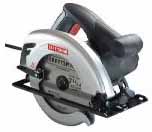
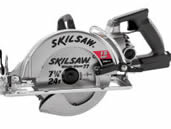
The one on the left costs $48, and weighs 9 pounds. The one on the right, a 'worm drive' costs $170.00 and weighs 16 pounds. Both of then will make exactly the same cuts so they are equal in versatility. Besides being heavy, the big one has the bad habit of kicking when you squeeze the trigger and (usually) needs two (big) hands to use it. None the less, it's the tool I reach for most of the time. (Unless I have to schlep to the top of a long ladder and lean out over a lot of nothing-but-down to cut a little something off this or that, and then I'm apt to use a hand-saw.)
I have my students, men and women, cut a 2x4 with both saws. The women usually agree that the big one is -in some ways- easier to use, but many of them decide they like the smaller one better. This is one of the things I try to accomplish in the Home-Mandy Man / Woman class: I help my students select the tools they need -neither too big and expensive -a waste of money -nor too little. (And getting a tool that is too cheap is a complete waste of money. The too-expensive tool will at least do the job.) I am going to do the same thing in thie article.
So to summarize the preceding and explain the following, these suggestions are for tools that will give you the best results, with the shortest learning curve, for the most money, and require the least strength, and do it SAFELY. Not necessarily the fastest results nor necessarily the prettiest. (For pretty, you might need to reach for some sand-paper.) A big manly specialized tool with lots of horse-power and RPM's, may be harder to control and will do more damage -make bigger accidental dents, cut too far, drill too deep, and send more people to the emergency room then a "girl" tool. Enough said?
The Apartment Dweller's Toolbox
Tape Measure:
I forgot this little item until my last draft, yet I spend a good part of my day with one clipped to my belt. How could I forget something so basic and so absolutely necessary? I don't know. Perhaps because it is so basic and vital. If you have only one tool, make it a tape measure. This way you can tell someone of the nail-belt & butt-crack crowd exactly what you want and they can make it for you. Or you can buy furniture and be sure it will fit. One important thing -you don't need a 30 foot monster tape. It's too big and heavy and expensive. 99% of everything I measure is less then 10 feet long and I'm a professional fer-goon'ess-sake.
Hammer:
This is the most basic tool. Archaeologists argue weather the hammer or the knife is mankind's first tool. I don't know this either, but a simple 16 ounce finishing hammer will do 95% or the nailing and smacking and just general banging you are apt to need done. Learn to use it correctly. If you find yourself using it (and forgive me here -there is no other way to say it) like a girl, drive 20 or 30 nails into some old board with your hand at the END of the handle. You will probably mangle a lot of nails, but you will learn something useful. Here is another tip. If it's brand new, rub the face of a new hammer on some course sandpaper to scuff it up and remove the schmuzt they put on it when they make it. If you don't have any sandpaper -rub it on the most convenient sidewalk.

Screw drivers:
Everybody has a screw driver somewhere. But if it's lost, it probably deserves to stay lost. Get a proper set. A medium & stubby Phillips-head and a medium & stubby slotted (regular). Better to spend the money on a few good ones rather then a whole set of cheap ones. Those long ones are nice too, -very handy and efficient, but we are looking for maximum utility here, not efficiency. A little stubby screw driver will do some things that absolutely no other screw driver will do.

PVC Saw:
 If you are a polymer chemist, PVC means poly-vinyl-chloride. Otherwise, it means the plastic that drain pipes are made from. Why do I suggest you buy a saw that only plumbers use you ask? Well, this saw is easy to use, will cut anything, (almost), will leave a nice finish, and will serve well in the kitchen if you have a recalcitrant bone. Need to cut a two-by-four? Get comfortable 'cause you are going to be at it for a while, but it will serve. Want to try your hand at making your own picture frame from a piece of pretty molding? If you are careful and cut a clean 45° miter, you might just get glue to hold it all together. Trying to open some damn-fool package that just will not open otherwise? Be careful not to drag it over metal, and this saw will do the job and make you feel a little like Attila-the-Hun.
If you are a polymer chemist, PVC means poly-vinyl-chloride. Otherwise, it means the plastic that drain pipes are made from. Why do I suggest you buy a saw that only plumbers use you ask? Well, this saw is easy to use, will cut anything, (almost), will leave a nice finish, and will serve well in the kitchen if you have a recalcitrant bone. Need to cut a two-by-four? Get comfortable 'cause you are going to be at it for a while, but it will serve. Want to try your hand at making your own picture frame from a piece of pretty molding? If you are careful and cut a clean 45° miter, you might just get glue to hold it all together. Trying to open some damn-fool package that just will not open otherwise? Be careful not to drag it over metal, and this saw will do the job and make you feel a little like Attila-the-Hun.
A little box of nails and do-dads:
 The likelihood of your being able to find exactly what you want in a box of hardware you bought at the grocery store is pretty low, but the likelihood of finding something that will sort of work is pretty high. If they have two sizes, buy the big one. As you use-up the nails, (and you will use up something 'cause there are only about 6 of everything in these assortments), you will figure out what you like. Then, when you buy more, you will have a place to put them.
The likelihood of your being able to find exactly what you want in a box of hardware you bought at the grocery store is pretty low, but the likelihood of finding something that will sort of work is pretty high. If they have two sizes, buy the big one. As you use-up the nails, (and you will use up something 'cause there are only about 6 of everything in these assortments), you will figure out what you like. Then, when you buy more, you will have a place to put them.
Pliers:
Get a simple pair of slip joint pliers. "Slip-joint" means that they sort of adjust in and out. One way you can use it to open a big-ol' bottle of catsup, and the other way they will work for those stupid little caps on tiny bottles of hobby paint. Notice that I also suggest you buy a wrench. A wrench often needs to be backed up with another wrench or something. Pliers make a good something, But do NOT use the pliers to do the turning. This is what a wrench is for. The pliers are only for holding the other end so it doesn't turn too. Pick you pliers so they fit your hand. You need something sized so it feels about right and so you can open the pliers by hooking your little finger under the handle.
Wrench:
This is a tool that does what it does pretty well, -metric, or English, open or obstructed, don't make no never-mind. Eight or ten inches should be about right. It's not the most efficient, but it will (almost) always get the job done. It is not, however, a hammer. We have all used a wrench as a "tapper / persuader" at one time or another, but don't. You have a hammer now,
Tools for the Household
Drill:
You want a rechargeable drill don't you? Nope, a rechargeable is your second drill. Your first drill plugs in to the wall. You don't have to worry about keeping it charged, or loosing the battery, or killing the battery by leaving it in the charger for weeks. And no matter how long you do heavy work, it will finish the job. Try drilling a hole through a piece of metal or stirring up a gallon of paint with a rechargeable drill and you will see what I mean. Get a VSR drill -this means Variable Speed Reversible.

These are almost the only drills you can find now, but the very cheapest drill they have will not be variable speed. The Jorgensen chuck -the kind that doesn't need a key- is also pretty common and worth the money. Remember our goal of getting maximum versatility for our tool buying dollar? If you live in a brick house, (I'm serious here), or have sidewalks or concrete patios- get a hammer drill.
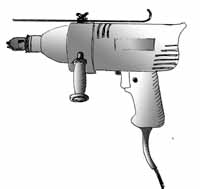
Just a little more expensive but a whole lot more useful. It has these extra fiddly-bits that might get in the way. Take them off, save them somewhere, and use it like a regular drill until you turn a little lever and then it hammers so you can drill holes in concrete with a special bit. You will find a small assortment of these concrete bits in a ...
Drill-bit set:
Drill bits are among the most specialized tools there are. A good set of one kind of bits is a beautiful thing. But you will need seventeen sets of expensive bits. A cheap set is not going to be able drill many holes, but how many holes of a particular sort do you need? Here is what I say. Buy one of those sets with the most common sizes of each drill bit ever made and then resolve to using them hard If they break or get dull, go out and replace the single bit you used up with a high quality bit and put it in the set. Meantime, you will be able to drill a lot of holes and a lot of different kinds of holes- with this assortment. Brings to mind the old boy who owned George Washington's ax. He had replaced the handle 5 times and the head twice, but it was still George Washington's ax.
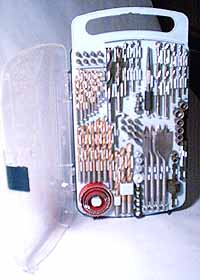
Socket set:
This adds an increased level of efficiency for the apartment dwellers set. Unless you have a foreign car and enjoy working on it, buy a non-metric set. Get a set with a 3/8 inch drive and -this is important- at least one 2 or 3 inch extender. One of these little do-dads will save your knuckles at least once.
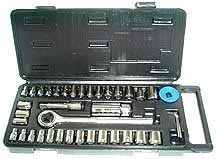
Circular saw:
A good carpenter on a job site can use his circular saw to do anything that a cabinet maker can do in a shop with all manner of expensive stationary tools. Takes a deft touch it may not be any too quick -and it will need more sanding, but it can be done. Truth to tell, a circular saw can do more then a table saw, radial arm saw, and chop saw all rolled into one, and do it at the top of a ladder if need be. Buy a cheap circular saw. When you burn out the blade, and you will burn it out because it's cheap steel, replace it with a carbide blade. This blade will likely outlive the saw -unless you are really careless and try to saw open the sidewalk. (I have a good friend -an engineer by training, who cut some plywood on the floor of his kitchen. The blade was out farther then he thought and he cut a beautiful perfectly straight groove across 6 terra-cotta tiles. Didn't hurt the carbide blade at all!). At some point -and it may be years and years- you may decide to get a big professional worm-drive saw. These saws are heavy as all-get-out, but in some ways easier to use then the littler saws. Put the carbide blade in the new saw and buy a metal cutting and / or ceramic cutting blade for your old saw and you will be ready for almost anything.

More Hand Tools:
Electrical Tools:
Needle nose pliers and wire stripper are handy for lots of stuff and essential for electrical work. Get them with insulated handles. A wire-strippers is also a wonderfully versatile tool -even if you don't do electrical work. The kind in the picture also acts as a (small) bolt cutter, wire cutter, and passable pliers. It you do plan to do electrical work around the house, a circuit tester is worth the money. A small VO meter is not all that expensive and useful, but you have to know what you are doing to use one. But you ought to know what you are doing if you are messing about with electricity to begin with.

Plumbing Tools:
This is a can of worms. You know what they say about cans of worms, if you open up one can, it takes a bigger can to close them all up again. A pipe wrench (above) will probably do you some good -particularly if you have to mess about with galvanized pipes, but why would want to mess about with galvanized pipes to begin with? Hire a pro here. If you have copper pipes, you might make the argument that a propane torch is a useful thing. They are also useful for lots of assorted other tasks, but they are NOT soldering irons, -not worth a darn for electrical work, but they will start charcoal!
Level:
Get a cheap 4 foot level. If you are not confident in it's accuracy, slap it up, make a mark, swap it end for end. If it is telling you two different stories, make another mark and split the difference. A little level is sometimes handy, but little (short) levels are not accurate. If you have to find the level for points twenty or thirty feet away, Buy 30 or 40 feet of 1/4 inch clear plastic tubing and fill it with water and red food-coloring. Lots easier and cheaper then using a transit.
Nails and do-dads:
There is absolutely no way that the home owner -nor the pro for that matter- is always going to have exactly the right fastener on hand. Pain it the butt to have to schlep off to the store for a fifteen cent fastener, but can't be completely avoided either. Buy yourself a pound of each of the following and you may save yourself a trip to the store once in a while. It will run you $31.93 in --2004 in northern California anyway. Don't know about you, but this is a small price to pay to get to the bottom of the Saturday's Honey-Do-List just that much sooner. You might also set aside a packet or two for hollow wall anchors. I have much to say about these little gems in my article The Correct way to Hang Things on the Wall.
| size | finish | type | |
|---|---|---|---|
| NAILS | 16 penny (d) | cement coated | Box Nails |
| 10 d | galvanized | " | |
| 8 d | cement coated | " | |
| 8d | bright | Finish nails | |
| 6 d | " | " | |
| 1 1/2" | galvanized (hot dipped) | Roofing barb | |
| 1/1/2" | phosphate coated | Drywall nails | |
| SCREWS | 1" #6 | black | Sheet rock screws |
| 1 5/8" | " | " | |
| 2" | " | " | |
| 2" | galvanized | " | |
| 3" | " | " |
Home-owner's Almost-a-Pro Tool Set.
By the time you have started on your own shop or garage work bench you probably have a pretty good idea of what tools you want. Permit me to make just a couple of comments and offer a couple of suggestions. For starters, take care of your tools. Find them a nice place to live -dry -not too dusty. Work benches are wonderful things if they are well lighted and you have power close at hand. Problem with most work benches is that they tend to be too dainty. Make it strong and heavy. Ugly is OK -but make sure you can do some serious pounding on it. And remember -it's called a "work bench" for a reason. It's not called a "pile up all the miscellaneous junk you don't know where else to put it and then you don't have any room to do any serious work" table. And if you have little ones, remember tools can be dangerous.
Rechargeable-battery drill:
These are wonderful things, IF you have a means of keeping them charged. I would also suggest you consider getting 2 or 3 cheap ones rather then one big one. When I'm doing assembly at my bench, I like to have at least two of them at hand -one to drill and one to drive screws.
Rechargeable-battery saw:
Get one that uses the same batteries as your drill. This is what I call a "father's day gift" tool. It's kind of cute, but turns out to be a very handy tool for certain things. Nothing better if you have to open up a wall. Run it through sheetrock with a vacuum hose tucked up behind the blade and an otherwise messy and dusty job is painless. If you are setting pine trim and are good, you can cut and go, rather then schlepping back to the chop saw for every piece. Here's how this works. You carry a tri-square and this little saw in your belt, measure & make your mark, and cut it, nail it up and move on. Swear-to-goodness, you can do the baseboard in an entire room and not get off your knees. (And it you are my age or thereabouts, once you get down there, you are -by-god- going to get as much done before you have to get up again.)
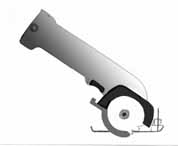
Fasteners:
You know what you need here -pick out your own and pick up a bunch of nuts and bolts too. The little assorted sets you get in the grocery store have cheap tiny things that will only fix toys and little stuff. I like to keep a few pieces of All-Thread and matching nuts around. A few seconds with a hack-saw and I have any length bolt I need.
Paint:
Did you know that people who measure the demographics of a neighborhood look at trash? Poor people throw out cans of stuff to fix their cars. Rich people throw out cans of stuff to spray on their gardens. And middle class folks you ask? They / we throw out cans of paint. I have only three pieces of advice on paint. (Actually I have a lot to say -in my article on Fast and Dirty Finishing Techniques.)
* First -find an old guy at the store and ask him your questions. There is a lot of miss-information floating around about finishing, and the kids they hire now-a-days are apparently hired based on their ignorance and surliness.
* Second -buy good paint and buy a new empty can. Pour out what you need for the job at hand into the empty can, close up the big can, and then use the little can to stick your brush into. Alternatively, if you expect to use most of the gallon can, pour the left-over into the new quart can. My thinking goes like this. The cost of paint is minor when compared to the value of your time putting it on, so buy good paint, BUT good paint ain't cheap neither. At least not when compared to the cost of an empty quart can.
* Third -learn at least one good technique for finishing fine wood work. I have used them all at one time or another and I like good old-fashioned shellac. Extra easy for the home-owner. Goes on easy. It's thinner -alcohol- is handy to have around for lots of other uses and it isn't to smelly. It dries fast. Shellac can be thinned and act as a sanding sealer or full strength as a stain block. While you are buying your shellac and thinner, buy some 000 or 0000 steel wool and a can of good paste wax. Rather then sanding the last coat of shellac, rub it down with steel wool and wax it at the same time. Makes for an easy and luxurious finish.
Cost Matrix: Any excuse to buy a tool is a good excuse. If you don't agree, or agree, but need to economize, have a look at the following. For the most part- the big tool set has the same stuff as the little tool set, just more of it. BUT, in some cases, if you are going to get the serious set, you might as well start with the good tool and not waste your time on the half-measure.
| item | specifications | apartment toolbox | home-owner's workbench | (almost) professional work-shop | |
|---|---|---|---|---|---|
| Hand Tools | tape measure | 12 foot |
$4.99 | $4.99 | $4.99 |
| hammer | 16 oz claw |
5.99 | 5.99 | 5.99 | |
5 pound sledge, short handle |
$12.95 | $12.95 | |||
| screw drivers | 4 piece set |
3.99 | |||
6 piece set (or more) |
9.97 | ||||
premier set |
19.95 | ||||
long set of the mother-of-all screwdrivers for prying and otherwise "persuading" |
14.95 | ||||
| pliers | medium |
4.95 | 4.95 | 4.95 | |
| crescent wrench | 10" |
10.00 | 10.00 | 10.00 | |
| socket set | pick your favorite, w/ extenders |
28.97 | 28.97 | ||
| level | cheap 4 foot |
14.97 | |||
| wire multi-tool | w/ bolt cutter |
12.97 | 12.97 | ||
| circut tester | little yellow plug-in type |
4.95 | 4.95 | ||
| propane torch | 7 piece kit |
19.97 | |||
sub-total |
29.92 |
95.74 |
155.57 |
||
|
|||||
| Drill & Bits | drill | single speed, reversible (plugs in the wall) |
$14.00 | ||
plug-in VSR |
29.00 | 29.00 | |||
12+ volt kit w/ charger and extra batterie(s) |
89.00 | 89.00 | |||
small rotary drill (hammer drill) |
59.00 | ||||
| bits | set of 13 cheap twist bits 1/16" thru 1/4" |
9.72 | |||
81 piece assortment |
29.00 | ||||
premier assortment |
59.94 | ||||
sub total |
24.00 |
147.00 |
238.00 |
||
| item | specifications | apartment toolbox | home-owner's workbench | (almost) professional work-shop | |
|---|---|---|---|---|---|
| Saw | hand saws | PVC saw | 15.00 | 15.00 | 15.00 |
| hack saw | 10.88 | 10.88 | |||
| power tools (saws) | cheap 12 amp circular saw | 38.00 | 38.00 | ||
| reciprocating or jig saw | 59.00 | ||||
| assorted blades for above | 10.00 | 20.00 | |||
| small rechargable circular saw | 115.00 | ||||
sub total |
15.00 |
74.00 |
258.00 |
||
|
|||||
| misc. | stapler | stapler / bradder |
16.97 | 16.97 | |
tacker hammer |
15.88 | ||||
| Box of nails, screws, etc. | cheap grocery store assortment |
5.00 | |||
make your own from the list above |
31.93 | 31.93 | |||
one or two of everythingin the hardware store |
??? | ||||
sub total |
5.00 |
49.00 |
65.00+++ |
||
GRAND TOTAL |
$74.00 | 366.00 | 716.00 | ||
© 2004 Bill Harvey